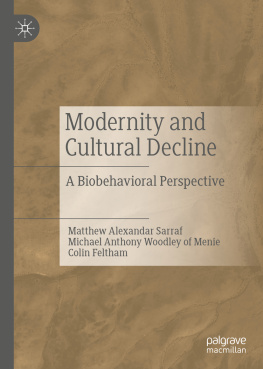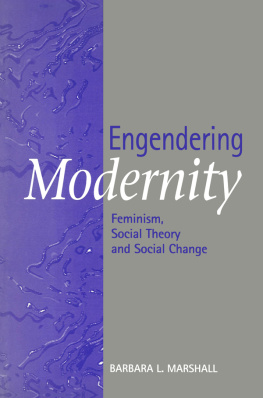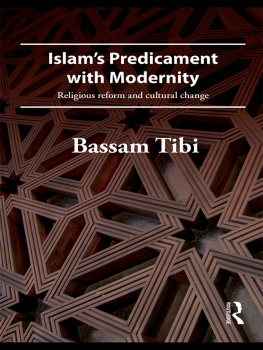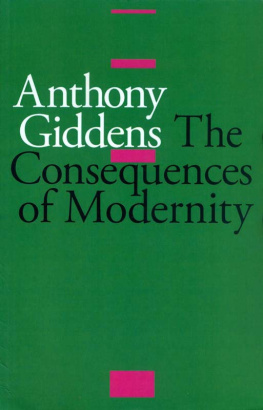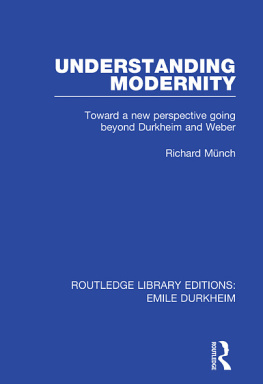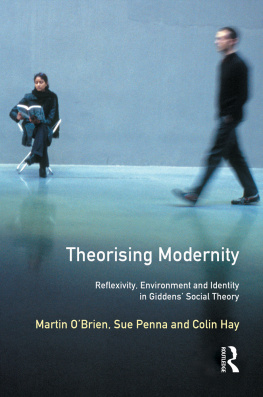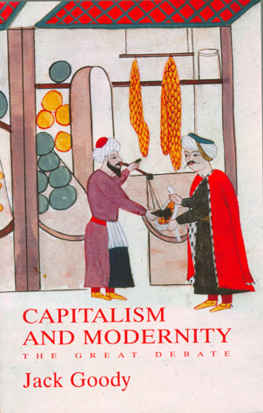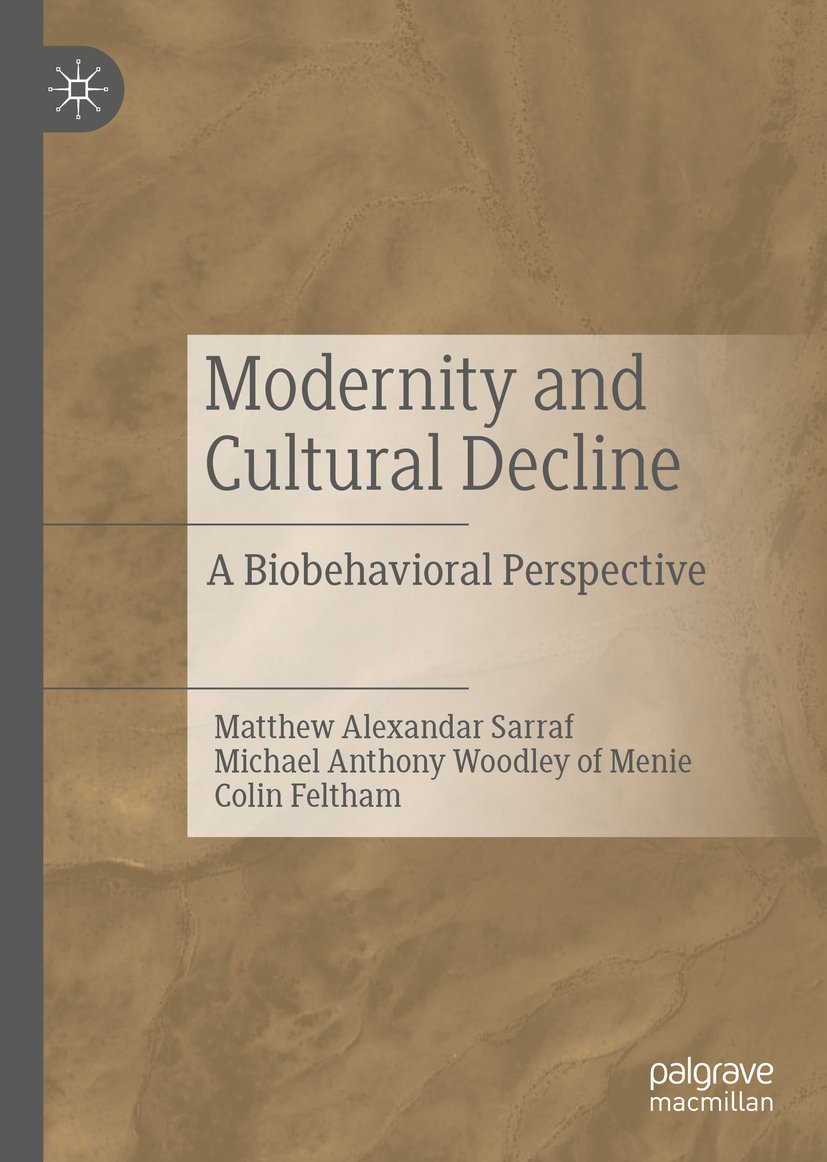Matthew Alexandar Sarraf , Michael Anthony Woodley of Menie and Colin Feltham
Modernity and Cultural Decline
A Biobehavioral Perspective
Matthew Alexandar Sarraf
Amherst, MA, USA
Michael Anthony Woodley of Menie
Vrije Universiteit Brussel, Ixelles, Belgium
Colin Feltham
Sheffield Hallam University, Sheffield, UK
ISBN 978-3-030-32983-9 e-ISBN 978-3-030-32984-6
https://doi.org/10.1007/978-3-030-32984-6
The Editor(s) (if applicable) and The Author(s), under exclusive license to Springer Nature Switzerland AG 2019
This work is subject to copyright. All rights are solely and exclusively licensed by the Publisher, whether the whole or part of the material is concerned, specifically the rights of translation, reprinting, reuse of illustrations, recitation, broadcasting, reproduction on microfilms or in any other physical way, and transmission or information storage and retrieval, electronic adaptation, computer software, or by similar or dissimilar methodology now known or hereafter developed.
The use of general descriptive names, registered names, trademarks, service marks, etc. in this publication does not imply, even in the absence of a specific statement, that such names are exempt from the relevant protective laws and regulations and therefore free for general use.
The publisher, the authors and the editors are safe to assume that the advice and information in this book are believed to be true and accurate at the date of publication. Neither the publisher nor the authors or the editors give a warranty, expressed or implied, with respect to the material contained herein or for any errors or omissions that may have been made. The publisher remains neutral with regard to jurisdictional claims in published maps and institutional affiliations.
This Palgrave Macmillan imprint is published by the registered company Springer Nature Switzerland AG.
The registered company address is: Gewerbestrasse 11, 6330 Cham, Switzerland
Modernity and Cultural Declineis a breathtaking scientific analysis of the riseand now the declineof Western civilization. The authors use of bio-genetics is unique and profound. Spengler and Toynbee would have been interested. We also should be interestedand forewarned.
Seymour Itzkoff,Professor Emeritus of Education, Smith College, USA
The authors advance a bold thesis to explain the decline of the West in terms of evolutionary processes. They discuss cutting-edge evolutionary theories of human sociality The authors explain the social epistasis amplification model and the role of spiteful mutations. The book puts human nature, genes and evolution back into historiography and sociology , from where those concepts have been largely expelled since the mid-twentieth century. The final chapter advances cosmological reasoning by providing a far-futures vision of the possible course of human space-colonization This is the real thing, sharp minds offering testable hypotheses based on quantitative models. As I readModernity and Cultural Declineit occurred to me that many university departments deserve to be restocked with genuine scientists.
Frank Salter,Former Researcher of the Max Planck Society, Germany
A profoundly important book. The authors have that rarest of combinations: vision and courage. This, combined with a vast technical knowledge, makes for a potent force. To tackle the evolutionary-genetic basis for the problems of Western civilization, in light of industrial technology, seems obvious, and yet they are the first to do so. And even if their highly pessimistic conclusion pans out, there is still much value in understanding our road to collapse. One can only hope that society finds the will to engage with these vital and consequential ideas.
David Skrbina, Senior Lecturer,University of Michigan, Dearborn, USA
Modernity and Cultural Declineis a supremely bold, thoroughgoing biological account of often unacknowledged double-edged or negative impacts of modernity [such as] rising psychopathology, nihilistic outlook and social incohesion. The actual plusses and minuses of life in the modern era are teased out in a profound chapter clearing away the political and philosophical lenses through which commonly modernity is viewed. Socio-cultural phenomenathe puzzle of the demographic transition as well as industrializationno less than psychology and morphology are here shown to be highly amenable to study in terms of genetics and evolution
In unusual depth of argumentation with voluminous evidence, there is no flinching at the great complexity of the data, which is treated forensically. Criticism in particular is dealt with comprehensively.
The gauntlet is thrown down with near exhaustive detail, providing food for thought, irrespective of how near the mark the authorsor in agreement the readermay be. This is the sort of science book of which we need more: highly innovative and expansive to the point of seeming blue-sky-thinking that nevertheless is grounded.
Steve Moxon, Independent Researcher,Author ofSex Difference Explained(2016)
M.A.S.: To the memory of my grandparents
M.A.W.o.M.: To the memory of Professor Henry Cosad Harpending
Acknowledgments
Gerhard Meisenberg generously provided comments on the entire manuscript, which improved it substantially. Steve Moxon and David Skrbina gave helpful feedback as well. Mateo Peaherrera-Aguirre and Heitor Barcellos Ferreira Fernandes offered critically important assistance with statistical analyses presented in Chap.. Discussions with Aurelio Jos Figueredo and Bruce Charlton helped the development of several ideas and arguments in this book. The authors alone are responsible for any shortcomings that remain.
Contents
List of Figures
1. Introduction

